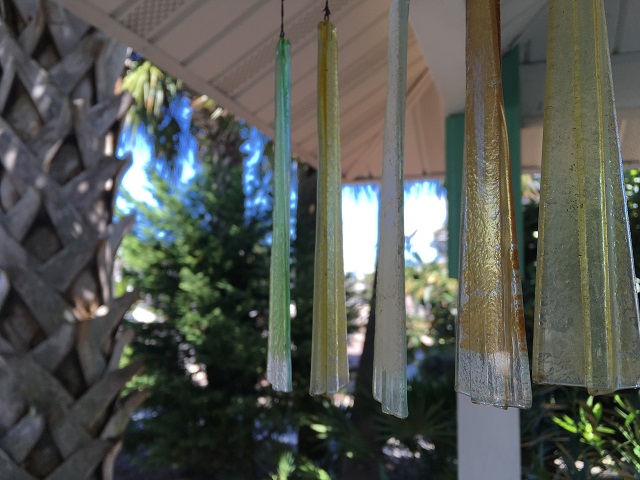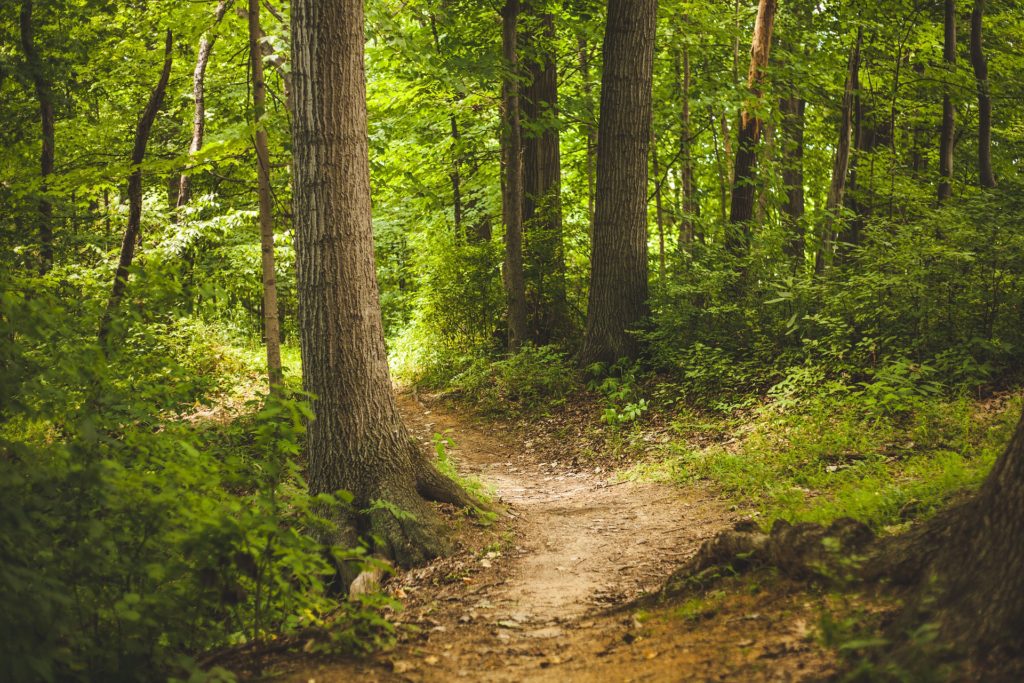Of Well-Worn Paths and Brand New Habits
In a curious juxtaposition, I find myself thinking about habits on a weekend when I’ve stepped out of many of my own. One notable exception? My morning cup of coffee…made even more enjoyable by the warm Florida breeze on the shady front porch where I’m writing.

The cottage wind chimes clink and sway as lizards climb the railing and nearby palm tree.
Habits can be incredibly useful. Think of things you can do almost without thinking as you care for yourself, your home, your garden…brushing teeth, getting dressed, making breakfast, emptying the compost bucket, pulling a few weeds en route to pick tomatoes, driving to school or work, getting ready for bed, and so many other daily tasks. Can you imagine how exhausting life would be if you had to think about every task as if it were a major decision? (Especially if you also have to get kids on board every. single. time. Thank you, routines!)
In The Power of Habit, Charles Duhigg describes how habits emerge “because the brain is constantly looking for ways to save effort.” Repeated actions and decisions get tucked neatly into deeper parts of our brain as autopilot takes over. When we don’t have to think about brushing teeth or getting dressed, our brains can focus on problem solving and other more difficult and creative work.
Good habits are like the paths Wendell Berry describes in The Art of the Commonplace:
“A path is little more than a habit that comes with knowledge of a place. It is a sort of ritual of familiarity. As a form, it is a form of contact with a known landscape. It is not destructive. It is the perfect adaptation, through experience and familiarity, of movement to place; it obeys the natural contours; such obstacles as it meets it goes around.”
Our familiar and well-worn habits help us skirt obstacles or free up brain power so we can figure out how to overcome them altogether. Simple habits over time add up.
What are the paths in your life that serve you well?

Of course, some habits serve us poorly. The late night snack more akin to chocolate than carrots. Plugging into screens instead each other. Falling into relationship patterns that lead to the same arguments. Making unhealthy choices around eating or drinking or smoking even though our logical brains know better.
Duhigg again:
“Habits are powerful, but delicate. They can emerge outside our consciousness, or can be deliberately designed. They often occur without our permission, but can be reshaped by fiddling with their parts. They shape our lives far more than we realize—they are so strong, in fact, that they cause our brains to cling to them at the exclusion of all else, including common sense.”
I listened to The Power of Habit on my drive to Florida, and I’ve spent the last few days catching up, talking and laughing with dear old friends. Away from my usual habits and responsibilities, the distance—physical and mental—brings new perspective.
I miss Colby and the boys deeply. It’s a connection that’s always there but sometimes covered by the busy-ness of life. How grateful I feel to have the chance to step away and see it.
Out of my usual habits, with sunny skies above and the smell of the ocean in the breeze, there’s an opening. A chance to examine my own well-worn paths and evaluate them.
Are my habits serving me well?
Are the default choices the ones I truly want?
Where do I want to do the hard yet possible work of changing habits?
Where do I want to be intentional about designing practices and routines for myself and my family?
I chose the habits audio book for the trip because Colby and I have been talking about how certain garden practices help us make our growing areas better and better over time.
While working on our upcoming course, Foundations of a Happy Garden, we identified the “seven healthy soil habits” that we use to create new garden beds and tend the older ones. (And yes, I did promise last week to tell you more about the course…that’s coming soon, but you can click the link above for a sneak peek and pre-sale discount. 😉 )
Colby and I debated about using the word “habits” to describe the practices. And after listening to the book on habits in general, I’ve realized that habits in the garden are precisely what we need to create. We want these seven practices to be second nature—the default ways of doing things in our own garden. And we think your garden will benefit from these habits, too.
More about the seven healthy soil habits soon. But for now, I’m curious to hear from you…
When’s the last time you made space to consider your routines and habits? (And it definitely doesn’t take a road trip and weekend with college friends. Maybe it’s fresh perspective thanks to a morning spent with a pen and journal in your garden or an afternoon hike in a local park.)
When you think about habits in your life, your home, your garden…are some well-worn paths that help you around obstacles and make more possible? Are there habits you would reshape? Or new routines you’d design to take advantage of the power of habits?
Tell me about it in the comments below.

You are so right. I’ve been working on becoming more intentional this year, out of true necessity. This has been one of the hardest years of my life, but also one of the most rewarding. Isn’t it funny how those times spur us? You’ve asked some thought provoking questions and given some great follow-up resources. Thanks so much!
You’re very welcome, Dawnita. Thank you for your comment! It is amazing how those hard times can also be rewarding ones. Glad you have been able to use the challenges to spur new growth. 🙂